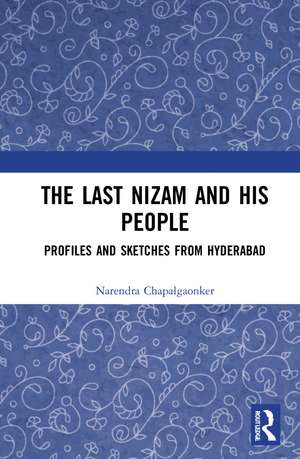The Last Nizam and His People: Profiles and Sketches from Hyderabad
Autor Narendra Chapalgaonkaren Limba Engleză Paperback – 29 ian 2024
A unique contribution to the literature on modern Indian and colonial history, this book will be indispensable for students and researchers of history, modern Indian history, colonialism, imperial history, biography, and South Asia studies. It will also appeal to general readers interested in the history of Hyderabad.
| Toate formatele și edițiile | Preț | Express |
|---|---|---|
| Paperback (1) | 389.66 lei 6-8 săpt. | |
| Taylor & Francis – 29 ian 2024 | 389.66 lei 6-8 săpt. | |
| Hardback (1) | 996.51 lei 6-8 săpt. | |
| Taylor & Francis – 26 apr 2022 | 996.51 lei 6-8 săpt. |
Preț: 389.66 lei
Nou
Puncte Express: 584
Preț estimativ în valută:
74.56€ • 78.07$ • 61.84£
74.56€ • 78.07$ • 61.84£
Carte tipărită la comandă
Livrare economică 10-24 aprilie
Preluare comenzi: 021 569.72.76
Specificații
ISBN-13: 9780367553999
ISBN-10: 0367553996
Pagini: 116
Ilustrații: 10
Dimensiuni: 156 x 234 mm
Greutate: 0.45 kg
Ediția:1
Editura: Taylor & Francis
Colecția Routledge India
Locul publicării:Oxford, United Kingdom
ISBN-10: 0367553996
Pagini: 116
Ilustrații: 10
Dimensiuni: 156 x 234 mm
Greutate: 0.45 kg
Ediția:1
Editura: Taylor & Francis
Colecția Routledge India
Locul publicării:Oxford, United Kingdom
Public țintă
GeneralCuprins
1. Sunset on Asafjahi 2. Maharaja Kishan Prashad 3. Shamraj Bahadur, Rayrayan 4. Justice Keshavrao Koratkar 5. Nawab Mehdi Nawaz Jung 6. Nawab Ali Yavar Jung 7. Kasim Razvi 8. Mir Laik Ali 9. Fareed Mirza 10. Sir Walter Monckton 11. Memories of a Bygone Culture
Notă biografică
Narendra Chapalgaonkar, born in Beed, Maharashtra, India in 1938, received his school education at Beed, and college and university education at Amaravati and Aurangabad. He taught at colleges in Latur and Aurangabad for a few years before joining the Bar. He practiced at Beed, Aurangabad and Mumbai for over 27 years. He was elevated as a judge of the Bombay High Court in January 1990 and retired in April 1999. He has written a number of books in Marathi, including a comprehensive biography of Swami Ramananda Teertha, one of the foremost leaders of the Hyderabad liberation struggle; a critical review of the Indian Constitution and its working during its first fifty years; and an account of the Hyderabad liberation struggle. He has, over the years, been associated with various educational, cultural and literary institutions and organizations in various capacities. He has also been Ford Professor in Public Law at the ILS Law College, Pune, as well as Professor Emeritus in the Social Sciences at the Yashwantrao Chavan Maharashtra Open University, Nashik.
Sharadchandra Panse, born in Pune in 1955, graduated in Political Science from Fergusson College, Pune, India and went on to study Law. He joined the State Bank of India (SBI) as a Probationary Officer in 1979. After serving in SBI for more than 22 years, he voluntarily retired in 2001 and has been a freelance translator and editor since. He can translate from and into Marathi, English and Hindi. He has completed four Marathi-English translation projects. He has edited the typescripts of five books and has also done other miscellaneous editing, as well as some occasional translations.
Sharadchandra Panse, born in Pune in 1955, graduated in Political Science from Fergusson College, Pune, India and went on to study Law. He joined the State Bank of India (SBI) as a Probationary Officer in 1979. After serving in SBI for more than 22 years, he voluntarily retired in 2001 and has been a freelance translator and editor since. He can translate from and into Marathi, English and Hindi. He has completed four Marathi-English translation projects. He has edited the typescripts of five books and has also done other miscellaneous editing, as well as some occasional translations.
Descriere
This book is a collection of profiles and sketches of some of the most important and influential people from the erstwhile Hyderabad State during the first half of the 20th century, which marked the last decades of its existence as a distinct entity under the British Raj.
